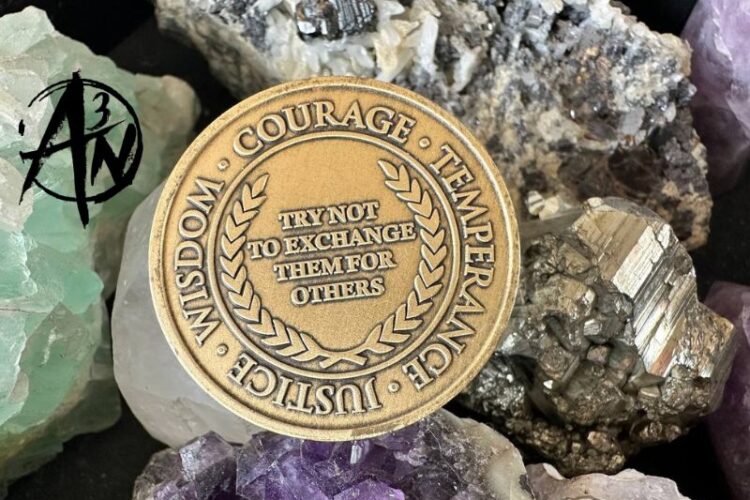
Stoicism and Agorism: Keep Calm and Build the Counter Economy
On my birthday this year, I was gifted a bronze colored coin adorned with images on one side and on the other, the words “Wisdom, Courage, Temperance, Justice: Try Not to Exchange Them for Others”. This came from a new friend who would quickly become one of the most important people in my life these last few months. When he gave me the coin, he told me it would bring luck to me. I held onto this coin and about a month later I asked where the coin was from, mostly just curious because I’d never seen a coin like that before. I’ve also never had someone give me something like that, in the way that he had.
He told me that it’s a coin from the Daily Stoic, and those four virtues written on the coin are the four most important tenants of stoicism and that to be a stoic, one must attempt to possess all of them, in balance with one another. My first instinct was something along the lines of “sounds a lot like how I view agorism.”
I started to look into stoicism that day and realized that I’d already been working towards living this way. There is an emphasis on balance of these virtues in an effort to live a good life while reducing destructive emotions like worry. This wise man who shared the coin with me once told me, “After all, what’s the point of worry? If you can control it, no need to worry. And if you can’t control something, there’s still no need to worry.” He’s right.
Agorism and Stoicism go hand in hand as far as I’m concerned, and my further research into the specifics of the origins and purpose of this philosophical practice have only further confirmed my suspicions on this matter. My hope by sharing what I’ve learned is to help other agorists find more peace and enjoyment in their daily lives.
Its easy to worry about the state of the world and the oppression of governments, but where the magic in life comes from is learning to find balance while pursuing things that both make the world as a whole a better place as well as our own personal lives. After all, what is the point of living if not to enjoy life and improve the lives of those closest to us?
A simple Google search will show you that the origin of Stoicism in general comes from the Ancient Agora in Athens with the goal of a well lived flourishing life by practicing certain virtues, which I’ll outline a bit later. Sound familiar? The thing I find really compelling about stoicism as a whole is its very much been developed as a practical operating system for dealing with anxiety, stress, and fear which are all pretty natural parts of this life that we live.
Stoics are not known to be “armchair philosophers” who like to get caught up in constant theoretical contemplation, they like to get their hands dirty in that they explore through actions. More emphasis and weight is always placed on action over words by stoics. And as far as I’m concerned and have written about in the past, the major difference between agorists and, say, libertarians is rooted in the same thing.
Libertarians spend a lot of time theorizing and complaining about the problems of the world, agorists are out here doing the damn thing to see what works and what doesn’t in an attempt to at least improve the quality and level of freedom within their own lives.
By finding balance between the four virtues, combined with doing things like actively working to differentiate between what is and isn’t within our control, we can live a better more peaceful daily life while actually living in accordance with the values we hold. By re-framing misfortune in life to use it as a tool for learning, to derive character-building benefits from things that would otherwise break the average person, we become stronger in spite of the state of the world instead of disenchanted by it.
A phrase common to Stoics and one adorned on another coin owned by this same man who gave me my coin is “Momento mori” which translates to something along the lines of, “Remember that you will die”. Basically its the stoic way of saying life is too fucking short to focus all of our attention on that which we cannot change.
And life is also too short to be miserable.
The acknowledgment and acceptance of the reality of death allows us to be more grateful for what we have, as well as the fact that it provides motivation to simply live a better more fulfilling life. As someone who has had repeated near death experiences, I can say this is a huge part of why I arrived at a fairly stoic lifestyle before I ever even really came across the concept this year.
And finally let’s talk about the four virtues cause they’re in many ways the foundation for which all of this sits on. These four word written on the coin: wisdom, courage, temperance, and justice. These are considered to be the only things required for living a good flourishing life. And what is the point of life if not to live a good one? These four virtues go hand in hand with each other and work best in balance, which I would guess why the coin also says “try not to exchange them for others.”
Wisdom is considered the primary virtue on which all the other three are based. In short, “wisdom they define as the knowledge of things good and evil and of what is neither good nor evil…knowledge of what we ought to choose, what we ought to beware of, and what is indifferent.”
Wisdom informs action, because action without having wisdom first is basically foolish. Wisdom is also extremely important as the famous prayer goes something along the lines of, “grant me the serenity to accept the things I cannot change, courage to change the things I can and wisdom to know the difference.” I’m not a huge fan of religion, but I’ve always liked that phrase because its accurate.
Courage is also referred to as “wisdom under pressure”. This is something every agorist should hold dear to their heart. This is the courage to face misfortune without crumbling before it, to face death, to hold to these principles of freedom we promote so heavily. As I’ve talked about both in speeches and previous posts, it takes an incredible amount of courage to actually live by agorist ideals in today’s increasingly intense world.
Justice is referred to as “wisdom in social life” and is by many considered most important. What good is having courage without a basic sense of justice, to not only better your own life but the lives of those around you? At that point it becomes selfish. The phrase “Do No Harm but Take No Shit” comes to mind when I think of this.
Temperance is commonly referred to as “wisdom in decision” and is all about self control. Finding balance between excess and deficiency and being guarded against extremes as much as possible. This can manifest in extremes between ways of thinking; for example, you don’t want to be overly positive or overly negative, as both (as far as I am concerned) are signs of mental illness. Its healthier to see an accept the negative in the world for what it is, while also being able to see the beauty. Many stoics believe that true abundance is having what is essential for a good life.
Just as stoicism doesn’t exist without the proper balance of these four virtues, living a good life as an agorist isn’t possible without being a stoic to some extent. We are not hear to yell into the void about the problems of the world, we are here to rebuild systems through active experimentation with the common goal of both increasing our personal freedom, as well as the freedom of those around us.
For lack of a better way of putting it, keep calm and build the counter economy.









